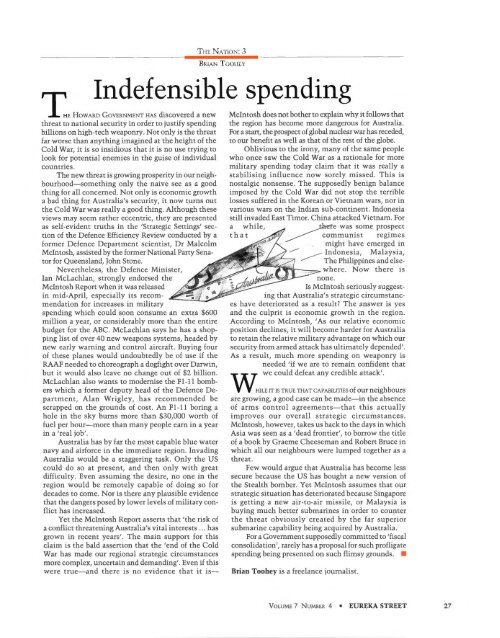expensive programmes of study.(ii) Students from privileged backgrounds willbe able to purchase their place in the coursesof their choice.(iii) Universities themselves will now bepressed into competition with each other, notonly in a market for governmental funds butalso in a new market for fee-paying students. Universitiesare, therefore, under very heavy pressure to become'customer-driven business organisations' to use the vapidwords and impoverished vision of the currentfederal Minister for Education.AS WE TRAVEL DOWN THIS market-driven road, anumber of worrying consequences will, I think, ensue.First, these reforms will exacerbate the alreadyexisting trend in universities to respond to economicdictates. In difficult economic conditions, the demandfor business and professional courses will continueto increase. Degrees will be pursued as tickets to jobs.Universities, in order to preserve their competitiveposition, will respond accordingly. It is for this reasonthat managers from within and without are nowslashing and burning the humanities and the classics.Many feel regretful, but money talks.Secondly, the 10-15 per cent decrease in universityoperating grants-the 4 per cent cut in operatinggrants compounded by an 8- 12 per cent pay rise-willforce universities and academics to seek ever widersources of external, private sector funding. Professorshave already becom e middle managers, soon they willalso be entrepreneurs. Taken to its logical conclusion,this will lead us to Professor Mal Logan's (untilrecently Vice Chancellor of Monash) heretical visionreported last year in the Weekend Australian(December 7, pS) . If h e was cited correctly, hissolution to the problems of under-funded faculties andresearch units appears to be partial privatisation.Instead of just getting rid of these faculties, he said:'Say OK, you have 12 or 18 months to generateenough revenue yourselves in a strategic, sensible waythat does not affect the quality of what you do andthat money can be used to increase your salaries.'Greater reliance on private sector generosity maywell produce more financial institutions but it takes onlya moment's refl ection to discern its potential impacton academic autonomy and intellectual freedom. Virtuousbenefactors exist, but they are few and far between.Thirdly, the inequity upon which this newsystem is borne will, in my view, tear imperceptiblyand insidiously at the fabric of Australian democracy.As we rob the weaker in society of their entitlementto good education at secondary level and to highereducation at tertiary level, w e deprive them of oneessential m eans of taking part in public debate anddeliberation and of equal opportunity in contributingto the formulation of the economic, social and culturalpolicies that affect them . We shall have free speech,but it will be exclusive not inclusive.It was Professor Mal Logan who cast himself as aheretic. In fact what he proposed fell comfortably withinthe main currents of modem economic orthodoxy. Butthere is another vision, nowhere better expressed thanby Professor Peter Karmel thirty years ago. Far sightedthen, and genuinely heretical now, Kannel said:'I do not hold that the main virtue of educationreposes in its economic consequences. Quite thereverse. I should tonight advocate a greater educationaleffort in Australia, even if its sole economic consequenceswere to reduce national production ... I shoulddo this since I believe that democracy implies nothingless than making educational opportunities as equalas possible and that the working of democracy dependson increasing the number of citizens with the capacityfor clear and informed thought on political and socialissues. Moreover I hold that the areas of expandedactivity which education opens should be m ade aswide as possible.' Some economic aspects of education,The Buntine Oration, Australian College ofEducation, Canberra, 18 May, 1962. (Publish ed byCheshire)We are presently in the grip of a powerful,fashionable fetish for economic solutions in educationand elsewhere. In my view, these need urgently to bebalanced by a more democratic position. In this, weneed to make a clear and firm restatement of the valuethat should attach to intellectual independence, academicfreedom, institutional plurality and criticalthought.For the university to claim the nam e, we need tostep beyond economic objectives and professionalroutine into som ething more lively, radical andparticipatory. To quote Edward Said in the 1993 BBCReith Lectures:'I would go so far as saying that the intellectualmust be involved in a lifelong dispute with all theguardians of sacred vision or text, whose depredationsare legion and whose heavy h and brooks nodisagreem ent and certainly no diversity.Uncompromising freedom of opinion and expressionis the secular intellectual's main bastion. Toabandon its defen ce or to tolerate tamperings withany of its foundations is in effect to betraywthe intellectual's calling.'SHOULD, BY ALL MEANS, advance economically.But in the process we should remember always thatthe autonomous university is not principally a meansbut an end- that the intellectual's calling is notprincipally to conformity but to critique.•Spencer Zifcak is Associate Professor of Law and LegalStudies at LaTrobe University.This is an edited version of a talk given to theVictorian Council of Civil Liberties/CommunicationsLaw Centre/Free Speech Committee Forum on FreeSpeech in Australia, held in Melbourne, 8 December1996.26EUREKA STREET • MAY 1997
THE N ATION: 3BRIAN TOOHEYIndefensible spendingL , H owARD GovceNMWT HAS discoveced ' newthreat to national security in order to justify spendingbillions on high-tech weaponry. Not only is the threatfar worse than anything imagined at the height of theCold War, it is so insidious that it is no use trying tolook for potential enemies in the guise of individualcountries.The n ew threat is growing prosperity in our neighbourhood-something only the naive see as a goodthing for all concerned. Not only is economic growtha bad thing for Australia's security, it now turns outthe Cold War was really a good thing. Although theseviews may seem rather eccentric, they are presentedas self-evident truths in the 'Strategic Settings' sectionof the Defence Efficiency Review conducted by aformer Defence D epartment scientist, Dr MalcolmMcintosh, assisted by the former National Party Senatorfor Queensland, John Stone.N evertheless, the Defence Minister,Ian McLachlan, strongly endorsed theMcintosh Report when it was releasedin mid-April, especially its recommendation for increases in militaryspending which could soon consume an extra $600million a year, or considerably more than the entirebudget for the ABC. McLachlan says he has a shoppinglist of over 40 new weapons systems, headed byn ew early warning and control aircraft. Buying fourof these planes would undoubtedly be of use if theRAAF needed to choreograph a dogfight over Darwin,but it would also leave no change out of $2 billion.McLachlan also wants to modernise the F1-11 bomberswhich a former deputy head of the Defence Department,Alan Wrigley, has recommended b escrapped on the grounds of cost. An F1-ll boring ahole in the sky burns more than $30,000 worth offuel per hour- more than many people earn in a yearin a 'real job'.Australia has by far the most capable blue waternavy and airforce in the immediate region. InvadingAustralia would be a staggering task. Only the UScould do so at present, and then only with grea tdifficulty. Even assuming the desire, no one in theregion would be remotely capable of doing so fordecades to come. Nor is there any plausible evidencethat the dangers posed by lower levels of military conflicthas increased.Yet the Mcintosh Report asserts that 'the risk ofa conflict threatening Australia's vital interests ... hasgrown in recent years'. The main support for thisclaim is the bald assertion that the 'end of the ColdWar has made our regional strategic circumstancesmore complex, uncertain and demanding'. Even if thisw ere true-and there is n o evidence that it is-Mcintosh does not bother to explain why it follows thatthe region has become more dangerous for Australia.For a start, the prospect of global nuclear war has receded,to our benefit as well as that of the rest of the globe.Oblivious to the irony, m any of the sam e peoplewho once saw the Cold War as a rationale for moremilitary spending today claim that it was really astabilising influence now sorely missed. This isnostalgic nonsense. The supposedly benign balanceimposed by the Cold War did not stop the terriblelosses suffered in the Korean or Vietnam wars, nor invarious wars on the Indian sub-continent. Indonesiastill invaded East Timor. China attacked Vietnam. Fora while, ~e was som e prospectthat ~ commumst reg1mes. might have em erged in------- Indonesia, Malaysia,'~" ·/"-~ ~ The Philippines and else""t,...._,.~~:J--~~where. Now there isnone.Is Mcintosh seriously suggestingthat Australia's strategic circumstanceshave deteriorated as a result? The answer is yesand the culprit is economic growth in the region.According to Mcintosh, 'As our relative economicposition declines, it will become h arder for Australiato retain the relative military advantage on which oursecurity from armed attack has ultimately depended'.As a result, much more spending on weaponry isneeded 'if we are to remain confident thatwe could defeat any credible attack' .W HJLE IT IS TRUE THAT CAPABILITIES of our neighboursare growing, a good case can be made-in the absenceof anns control agreements-that this actuallyimproves our overall strategic circumstances.Mcintosh, however, takes us back to the days in whichAsia was seen as a 'dead frontier', to borrow the titleof a book by Graeme Cheeseman and Robert Bruce inwhich all our neighbours w ere lumped together as athreat.Few would argue that Australia has becom e lesssecure because the US has bought a new version ofthe Stealth bomber. Yet Mcintosh assumes that ourstrategic situation has deteriorated because Singaporeis getting a new air-to-air missile, or Malaysia isbuying much better submarines in order to counterthe threat obviously created by the far superiorsubmarine capability being acquired by Australia.For a Government supposedly committed to 'fiscalconsolidation', rarely has a proposal for such profligatespending being presented on such flimsy grounds. •Brian Toohey is a freelance journalist.VOLUME 7 N UMBER 4 • EUREKA STREET 27
















